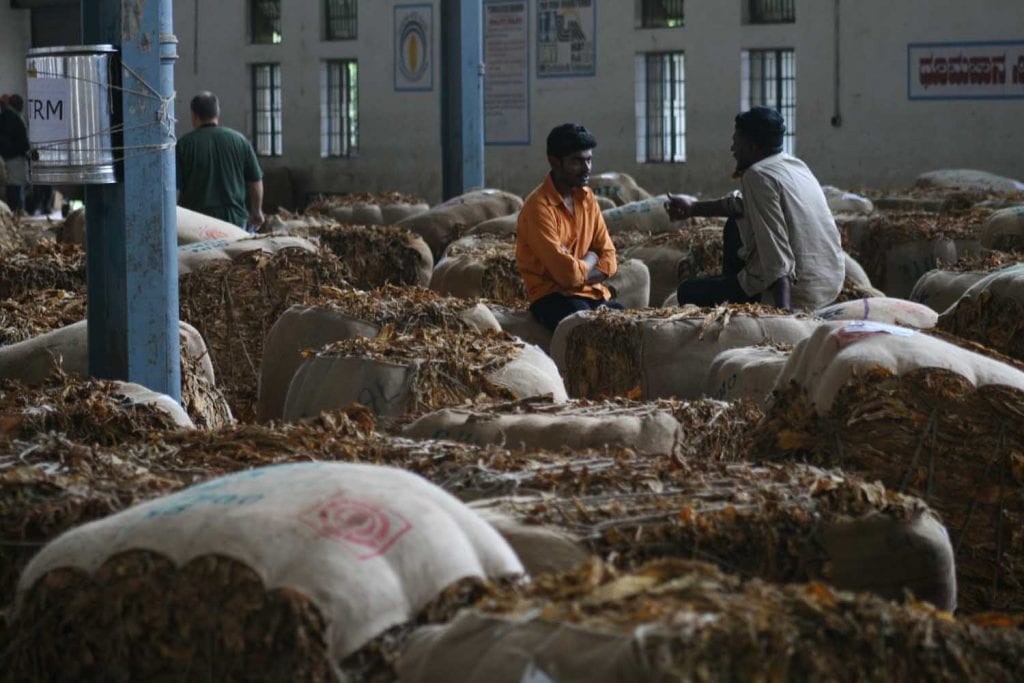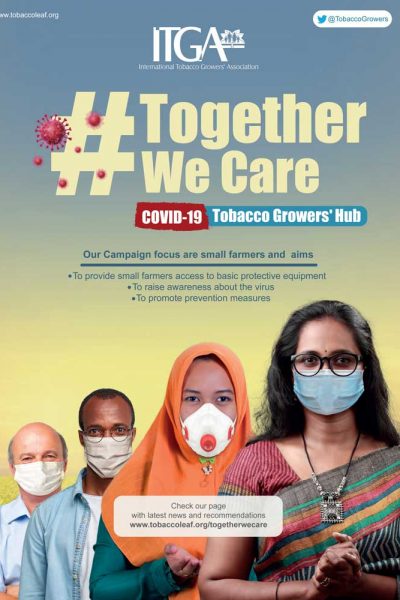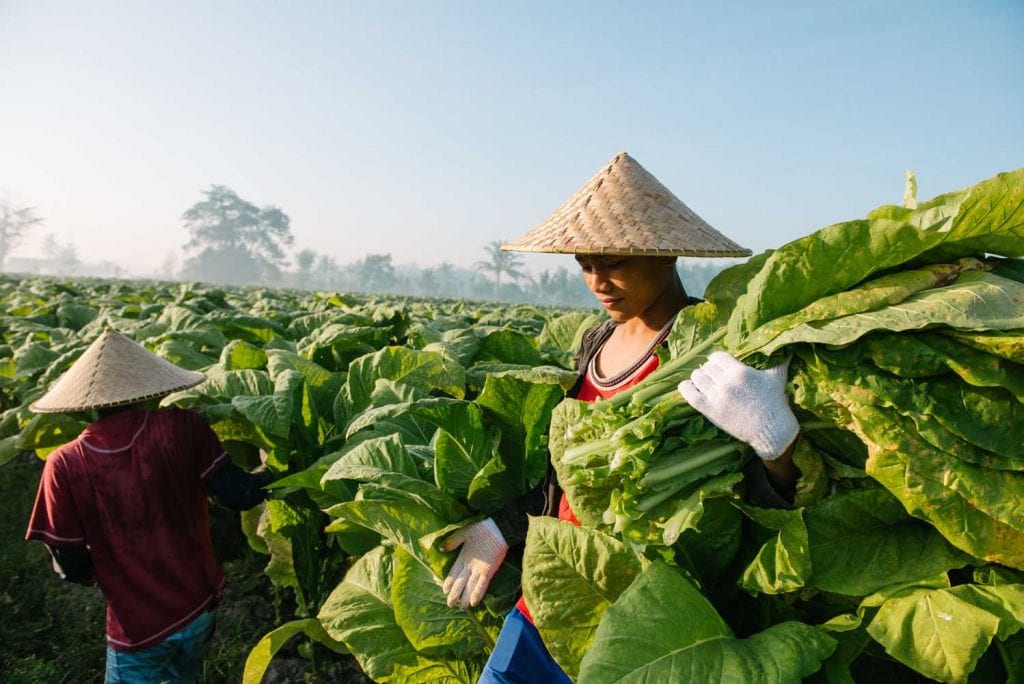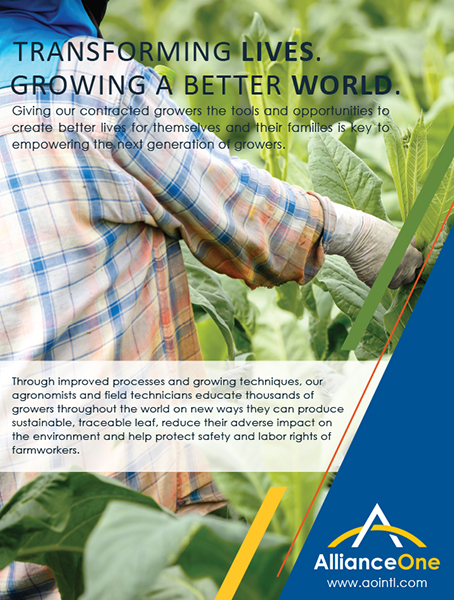Feeling Their Pain
- Also in TR Leaf Print Edition
- June 1, 2020
- 0
- 0
- 14 minutes read

The International Tobacco Growers Association is campaigning to help noncontracted farmers cope with the coronavirus pandemic.
TR Staff Report

While the multinational cigarette makers are likely to emerge from the coronavirus pandemic with only minor bruises, some of their suppliers are in dire straits. For noncontracted tobacco farmers, who rely on busy sales floors and healthy farm hands to ply their trade, the crisis has been downright devastating. The International Tobacco Growers Association (ITGA) has started a campaign to alleviate their suffering. Using an appropriately socially distanced method of communication—email—Tobacco Reporter asked the organization about its initiative. Because the answers were compiled by a team, ITGA requested we attribute them to the organization rather than an individual.
Tobacco Reporter: Which leaf-producing countries will be hit hardest by the coronavirus pandemic?
ITGA: So far, the most affected is India due to the Andhra Pradesh marketing season disruption. The tobacco auctions were active both in Karnataka and Andhra Pradesh. The auctions were suspended in the two regions; however, in Karnataka, the auction was close to its ending date, while in Andhra Pradesh the marketing season had recently started, so the impacts of the suspension will be felt there more severely. The lack of international leaf dealers—especially from China—due to traveling restrictions during the Karnataka auctions was one of the reasons for prices not being higher.
The difficulty of storing tobacco will affect Andhra Pradesh. The region’s tobacco production may suffer critical reductions due to this unforeseen situation. The decreased demand due to tobacco companies not being deemed “essential” will also affect tobacco growers by causing financial losses due to the erosion of both the quantity and quality of the production. In Andhra Pradesh, only 5 percent of the tobacco was sold [in early May] compared with 50 percent last year. The tobacco manufacturers and tobacco businesses had to close, and demand for tobacco products has been estimated to have decreased by 20 percent.
In South America, after a period of suspended operations, tobacco manufacturers and leaf dealers have resumed their operations and the activities are in full swing. In Argentina, the regional governments have put in place strict regulations to protect everyone involved in the marketing season. Dialogue between tobacco associations and tobacco companies has progressed with a deal having been struck for the tobacco purchased in the Misiones region, with a 59 percent price adjustment compared to the one paid last year. Argentina stands out for the macroeconomic difficulties the country was already facing; together with the Covid-19 disruption, that is sure to affect tobacco growers directly. The closing of the tobacco factories has caused shortages of cigarettes and tobacco cooperatives to be stuck with unsold tobacco.
Afubra, the national tobacco growers’ organization of Brazil, has downgraded the value of tobacco products. The drought felt in southern states during December 2019 and January 2020 caused losses in the Rio Grande do Sul of around 16 percent. Both Argentina’s and Brazil’s tobacco associations have made a plea to tobacco manufacturers for an advance on the price of the tobacco bought that would be deducted from the final sale price. Tobacco growers would use the revenue to finance wages, inputs and other expenses during this period.

In African countries such as Zimbabwe and Malawi, which both depend heavily on tobacco as a foreign exchange earner, tobacco auctions have been suspended and then opened amidst the Covid-19 crisis. What impact do you expect for farmers due to the delay?
The Malawi Tobacco Commission had announced at the beginning of April that excessive rainfall and the lower prices during last year’s campaign had affected the 2019 to 2020 tobacco crop. Tobacco output was estimated to decrease by 6.62 percent to 155,000 tons. There were growing concerns that if the marketing season were to be delayed further into the future that the tobacco could suffer in return due to the lack of facilities to adequately store tobacco for longer periods of time. An extended delay would result in part of the production to be lost, which would have an extremely negative impact on the livelihoods of those who rely on tobacco as a source of income.
In Zimbabwe, the marketing season had been delayed before the Covid-19 [virus] became an issue in the country. Episodes of rainfall close to the beginning of the marketing season allowed for the crop to recover from episodes of drought that it faced earlier in 2020. The Tobacco Industry and Marketing Board has assessed that tobacco output will reach 225,000 tons, a decrease of 13 percent from last year’s production. The tobacco output was initially expected to be significantly lower due to decreased growers’ registrations and tobacco seed sales.
Both Malawi and Zimbabwe are highly dependent on tobacco as a source of foreign exchange—a reality that the Covid-19-induced economic crisis will surely worsen. Therefore, this year’s marketing season must be a successful operation so that the livelihoods of the millions involved in tobacco growing do not suffer dramatically. Although, it is premature to assess the impact of the Covid-19 pandemic on the African marketing season. The auction and contract floors opened with higher measures of hygiene and protection with the aim to protect tobacco growers, leaf dealers and everyone involved in the sales. In Zimbabwe, even though the first bale received a lower price than last year—$4 versus $4.50—the amount of tobacco sold and the revenue generated on the first day was higher. Tobacco growers don’t usually send their best tobacco at the beginning of the season to better understand how prices will progress, thus saving the best for last. In Malawi, the introduction of a new bidding system has been singled out as the reason behind the higher rejection rates. As farmers adapt to this new system, rejection rates will likely decrease. Tama Farmers Trust and ITGA President Abiel Kalima Banda has called for a stakeholder meeting to address the problem and find a solution.
Most tobacco sales today take place under growing contacts. To what extent do you expect the current crisis to change this?
Most of the tobacco growing is done through contracts; however, there is still a significant number of independent farmers. The trend of the increasing share of contract growers will persist or become even more evident. The Covid-19 pandemic will only exacerbate the differences between contracted and noncontracted growers. Independent farmers are much more exposed to the effects of the coronavirus as they don’t benefit from the tools and support the companies provide, while contracted growers are assisted by the companies with both knowledge and supplies. With the closing or demand turbulence of the auction floors or demand disruption, the only growers that are certain that their tobacco will be bought are the ones subject to contracts. That is the main reason behind our campaign—#Togetherwecare—to support the tobacco growers that are most undefended against a threat of this nature.
What impact do you anticipate from the coronavirus crisis for the supply-demand of leaf tobacco?
Tobacco production has been decreasing over the past few years as an effect of the lower demand for tobacco products. Tobacco growers are adapting to this situation by lowering the area under tobacco production. Due to weather events both in Brazil and Zimbabwe, the estimate for tobacco output has been adjusted downward from what was initially projected. As ITGA members are spread around the globe with significant economic and cultural differences, the ability to adapt and to respond to situations differs from country to country. Regarding the market adjustment, only when the marketing seasons are well underway can the effects be correctly assessed. The main Asian tobacco markets of China, India and Indonesia are key to understand if major demand shock will occur. For India, a 20 percent demand reduction has been estimated while Philip Morris International has confirmed a significant reduction in the Asian markets. Indonesia has also introduced minimum price regulation that may exert more pressure on the lower end of the market. With the economic effects following the pandemic with higher unemployment rates, smokers usually change to cheaper brands, an effect that is negated with the minimum price.
How will this affect cigarette manufacturers, most of whom claim to have sufficient stocks?
Tobacco manufacturers are not to suffer from reduced sales due to the nature of tobacco products demand. The consumption of cigarettes, heated-tobacco units and other types of nicotine-delivery systems is not expected to be affected by the coronavirus. Analysts from the Jefferies Investment Bank have characterized tobacco stocks as being “recession-proof,” the reason for this being that smokers are less worried about health concerns. Smokers have been bombarded with ever-increasing warnings for a long time and have developed a certain immunity to health warnings. Also, the link between anxiety and the use of tobacco products has been the subject of many studies, and the fact that a relevant percentage of the world’s population is being motivated to stay at home can increase the levels of anxiety which would lead to an increase of the consumption of tobacco products. Tobacco manufacturers have reported strong first-quarter results with important revenue growth. The tobacco operations are spread throughout the world although the main manufacturing centers are in the regions that were most affected by the pandemic, with several operations having closed for some time. The main tobacco companies have, however, reiterated that the supplies of tobacco products are sufficient for up to two months.

Is the crisis an opportunity to rethink established supply chains and processes in the leaf-producing sector?
Without doubt, this has been one of the most challenging quarters in recent history. The Covid-19 pandemic has affected the world as a whole. One of the side effects of the pandemic has been its ability to disrupt the global supply chain. Globalization affected the way companies and industries operate. Supply chains have evolved to a planetary dimension and it is common to consume products that are produced half a world away. Despite the disruption to the global supply chain, the trend of moving tobacco production from developed countries to developing countries is not expected to change. The reasons behind moving the sources of tobacco have not changed with the pandemic. The pressure on tobacco products demand means companies will continue to lower costs along the entire value chain. As tobacco volumes will not increase, companies can search only for efficiency and margins gains.
Please elaborate on ITGA’s campaign to help small, noncontracted growers.
The ITGA has been in close contact with its members to assess the difficulties that this pandemic has been posing. Despite the global character of the outbreak, certain difficulties are particular to each region. Our members in the most affected regions have highlighted that they are starting to notice a lack of inputs for tobacco farming and that travel and transport restrictions have impacted the regular operations of growing tobacco. As tobacco is a labor-intensive product, any disruption to the movement of workers or to the hiring process could disrupt the harvesting season. The difficulty in earning a work visa or blocking the travel particularly affects products that rely on seasonal migrant workers. Our campaign is focusing on raising awareness and bringing basic equipment to smallholder farmers. Prevention and information are key at this phase to avoid a much more uncontrollable situation in these countries with fragile health systems and infrastructures. We have been seeking support since early April in view of the start of the selling season, which was delayed until the last week of April in Malawi and Zambia and the beginning of May in Zimbabwe. Coordination in these three countries has been outlined. It is very unfortunate that the ITGA acted in advance, foreseeing the free movement of noncontracted growers and inappropriate gatherings between farmers lacking basic protective equipment, but our plans in coordination with our members are set back in the absence of support.

It is imperative that the sector unites to protect the chains most exposed to the difficulties highlighted by Covid-19. As studies show, tobacco is grown as a cash crop in a multi-production system. Most tobacco growers do not exclusively produce tobacco. As other sectors and supply chains are disrupted by the outbreak, the noncyclical nature of the tobacco sector and its ability to outperform other industries during economic slowdowns is key to reinforcing the role of tobacco as the source of income for many growers.


